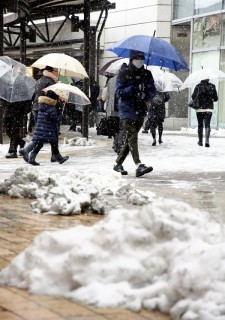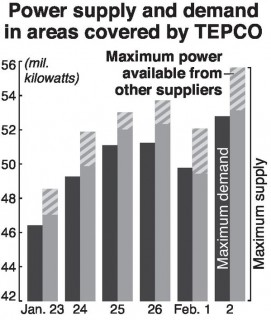Search
▼ TEPCO Battles On To Supply Power
- Category:Event
Tokyo Electric Power Company Holdings, Inc. has coped by receiving electricity over a succession of days from other regional power suppliers as an emergency measure. However, another cold wave is expected this week or later, and the tight power conditions are expected to continue for the time being.
TEPCO received electricity from other suppliers for four consecutive days from Jan. 23, mostly due to the sharp drop in temperature and snowfall, which increased demand for electricity for heating. It was the first time in about three years that TEPCO received emergency supplies of electricity.
On Jan. 26, the maximum demand for electricity in the areas covered by TEPCO reached 51.24 million kilowatts — exceeding last winter’s maximum demand of 49.57 million kilowatts. The emergency measure continued into February, making this winter particularly unusual in terms receiving electricity from others.
In particular, demand for electricity on Feb. 1 could have exceeded supply had there been no electricity provided by other suppliers. An industry expert said, “In the worst case, there was the risk of a large-scale power cut.”
Solar power generation has sharply increased in Japan following the introduction of the feed-in-tariff system in 2012, which requires power firms to purchase renewable energy at fixed prices. The area covered by TEPCO have also expanded sharply. On one day last December, solar power generated more than 10 percent of its total electricity demand.
However, solar power output fluctuates wildly due to the weather. The amount of electricity TEPCO purchased from private firms and others decreased sharply when the recent snowfall in the Kanto region covered parts of the solar panels belonging to those entities.
Problems at thermal power plants have also contributed to the tight power conditions. TEPCO initially planned to resume operation of a dormant thermal power plant in Ibaraki Prefecture and another in Fukushima Prefecture in mid-January in preparation for the cold wave, but was unable to do so for a few weeks because of technical problems at the facilities. Given that the combined output of the two plants is 2 million kilowatts, the delay had a major impact.
Prior to the Great East Japan Earthquake in 2011, about 30 percent of the total electricity generated by TEPCO came from nuclear power. TEPCO’s dependence on nuclear power was high, even among the major power suppliers. While there are no immediate prospects for the restart of nuclear power plants that have been suspended since the earthquake, a TEPCO official said, “We are in a situation in which all the thermal power plants have to be operated at full capacity.”
Under the current circumstances, TEPCO has no alternative but to rely on electricity from other suppliers when demand for electricity is very high.
The recent high demand for electricity is believed to be partly due to intensifying production activities amid the economic recovery. The preliminary figures for Japan’s industrial production index in December 2017 are the highest since October 2008. An increase in the operation rates of factories has apparently boosted demand for electricity.
The Pyeongchang Winter Olympics in South Korea starts from Feb. 9. More people are expected to spend more time in their homes or other buildings to watch the games on television, and this is seen as a possible factor that could boost power consumption.
TEPCO has called on people to save power, such as by switching off unnecessary heating and lighting. Still, an even higher increase in demand for electricity is possible, depending on the temperature and need for heating.Speech
- February 5, 2018
- Comment (0)
- Trackback(0)



